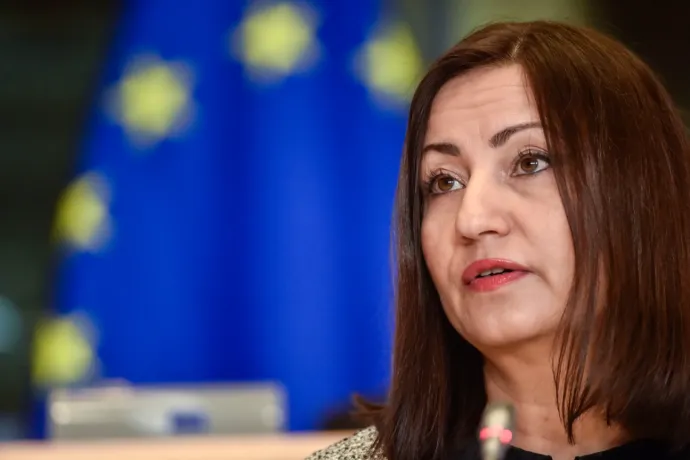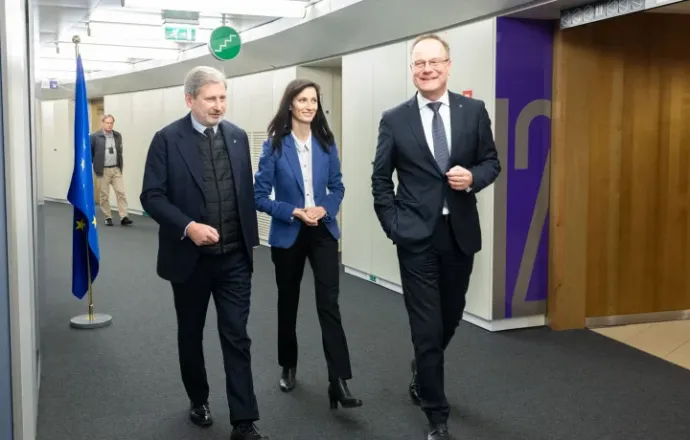EU Commissioner-designate for education: I cannot promise to do what the Hungarian state has to do on Erasmus

Rules are rules, they have to be followed and I can't promise to do the job of the Hungarian state, Iliana Ivanova said on Monday regarding the Erasmus case.
The Bulgarian politician was nominated in the summer to take charge of education, research, innovation, culture and youth at the European Commission. She will join the body once she has been approved by the European Parliament. Prior to that, however, the Parliament's specialised committees in her prospective fields had to assess her suitability for the post.
She will help the Hungarian authorities, but they will need to do their job
As a member of one of the relevant committees, Andrea Bocskor was one of those given the floor at Monday’s hearing. The Hungarian MEP from Transcarpathia, who was elected to the EP from Fidesz' list, asked about the "discriminatory procedure affecting Hungarian students, teachers and researchers", which she described as one that was initiated by the European Commission "on the basis of a European Council's regulation in connection with the exclusion of universities which have undergone a model change from the Erasmus+ and Horizon Europe programmes".
As part of the rule of law procedure, and on the Commission’s proposal, a decision was taken last December by the sectoral ministers of the member states sitting in the Council of the European Union (the European Council is another body). Among other things, due to concerns over transparency and conflicts of interest, public interest trusts and institutions functioning with such a background were banned from new EU commitments. The decision is particularly painful in relation to the Erasmus+ educational exchanges and the Horizon Europe research programmes for universities which underwent a model change.
At the hearing, Iliana Ivanova said that she is aware of the dialogue between the European Commission and the Hungarian authorities aiming to ensure that the latter take the necessary measures and legal commitments in response to the Commission's questions. She regretted that young people and students could be cut off from the programmes, but "rules are rules, and they have to be followed".
"I am aware of the problems, the stalemate and the lack of progress" in these negotiations.
The commissioner-designate promised that if she is approved, she will be part of the solution and not the problem. If the Hungarian authorities need more information and clarification to make progress, she will participate in the dialogue,
"but I cannot promise to do what the Hungarian state has to do".
She did not dare give 100 percent assurance that a solution would be found.
We must continue the dialogue and look for a solution, because autumn is coming and it would be very unfortunate to see a "reduction" of opportunities when the new calls for young people appear.They should not be hostages of this situation.
In response to Andrea Bocskor's next question, she said she couldn’t give a deadline for when the situation would be resolved, "I cannot give you a date" for when the Hungarian authorities will comply with what the European Commission has asked them to do.
Fidesz: Brussels bureaucrats, the darkest times of history, nationality-based restrictions
Fidesz' EP group issued a statement following the hearing. In it, MEP András Gyürk claimed that the European Commission had "gone over the line" in the case. "Only in the darkest periods of history has participation in university exchange programmes and scientific cooperation been restricted based on nationality. But this is the road that the Brussels bureaucrats have taken," he said, despite the fact that the decision does not affect all Hungarian universities and, in the case of institutions which underwent a model change, it is not only Hungarian students who are affected, and commitments were almost unanimously prohibited by member state ministers acting on a Commission proposal. (The Council actually relaxed the original proposal somewhat, but kept the prohibition regarding public trust funds in place. Last December's decision found that the foundations were not operating transparently enough, that there were political decision-makers sitting on their boards, which was a conflict of interest, and that the Hungarian government had not addressed the Commission's objections, which had been made public months earlier.)
“The change didn't come at a good time”
The Commissioner-designate's predecessor, Marija Gabriel, resigned in May to run for the post of Bulgaria's head of government (Until a new commissioner is installed, a Greek member of the body is filling in temporarily). Hungary's Minister of Regional Development, Tibor Navracsics admitted that Gabriel's departure "didn't come at a good time". The minister is the one representing Hungary in talks with the European Commission on the blocked EU payments as well as the commitments of the public trust funds. Thus, he had earlier negotiated with both Marija Gabriel and Johannes Hahn, the Commissioner responsible for the budget.

Tibor Navracsics told ATV on Monday that he was confident that an agreement would be reached,
and no Hungarian student will miss out on Erasmus.
The next round of negotiations will take place in early to mid-September with Johannes Hahn. "The autumn of 2024 is a likely deadline, we now actually have to agree on funding beyond the second half of 2024, but there is plenty of time until then."
The European Commission had previously talked about September, but the Tempus public foundation, which manages Erasmus, adopted decisions on conditional funding over the summer. (Regardless of the Council decision, applications may still be submitted and evaluated, but signing financial commitments is forbidden). Tempus has mentioned 23 November as a target deadline. Based on a statement by Tibor Navracsics a few days ago, this was calculated based on the procedural deadlines.
Public foundation-run universities were already complaining in June about losses amounting to millions of euros, not because of Erasmus, but because of Horizon Europe tenders. For the time being, thanks to the Hungarian state providing five billion forints in funding, they can participate in these as associate members and, in principle, can have the EU pay the money back later. At the same time, the universities that have switched to being run by public trust foundations have said that the other applicants don't even include them in the tenders, which are typically announced for several cooperating institutions.
Ivanova's chances seem good
The European Parliament will vote about Ivanova at its next session on 11-14 September. The heads of both parliamentary committees concerned and Iliana Ivanova herself were pleased after the hearing, according to Politico, with the Brussels paper noting that the MEPs did not seem to want to be too hard on her with their questions. But the candidate cannot be planning for the long term: after next June's EP elections, the entire European Commission will be renewed, and even if the Bulgarian government were to nominate her again, she might not be given the same portfolio.
For more quick, accurate and impartial news from and about Hungary, subscribe to the Telex English newsletter!